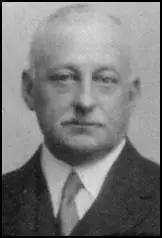Miguel Primo de Rivera

Miguel Primo de Rivera was born into a wealthy family in Jerez, Spain, in 1870. He joined the army and took part in the colonial wars in Morocco, Cuba and the Philippines.
After the First World War Primo de Rivera held several important military posts including the captain-generalship of Valencia, Madrid and Barcelona. On the death of his uncle in 1921 he became Marques de Estella.
With the support of Alfonso XIII and the army Primo de Rivera led a military coup in September 1923. He promised to eliminate corruption and to regenerate Spain. In order to do this he suspended the constitution, established martial law and imposed a strict system of censorship.
Primo de Rivera initially said he would rule for only 90 days, however, he broke this promise and remained in power. Little social reform took place but he tried to reduce unemployment by spending money on public works. To pay for this Primo de Rivera introduced higher taxes on the rich. When they complained he changed his policies and attempted to raise money by public loans. This caused rapid inflation and after losing support of the army was forced to resign in January 1930.
Miguel Primo de Rivera, the father of José Antonio Primo de Rivera, died from diabetes on 16th March 1930.
Primary Sources
(1) Miguel Primo de Rivera, speech (September 1923)
We have reason on our side and, therefore, force, though so far we have used force with moderation. If an attempt is made to trick us into a compromise which our conscience considers dishonourable, we shall demand greater penalties, and impose them with greater severity. Neither I, nor the garrisons of Aragon, from whom I have just received a telegram in support, will agree to anything but a military dictatorship. If the politicians make an attempt to defend themselves, we shall do the same, relying on the help of the people, whose reserves of energy are great. Today we are resolved on moderation, but, on the other hand, we shall not shrink from bloodshed.
(2) Luis Bolin, Spain, the Vital Years (1967)
Unlike the national rising against an even graver situation that set off civil war in 1936, General Primo de Rivera's move was a classic coup d'etat, swiftly and ably executed by a man who did not hesitate to take the entire responsibility on his shoulders. He relied on the partially expressed support of the Army, though not all its leaders backed Primo, nor were they with him unflinchingly until the end.
There was no opposition from political parties or labour unions. The majority of the nation resigned itself to a fait accompli and hoped for the best, or for something sensational, but there were no street scenes, no riots, no shooting. Objective and far-sighted citizens, without a stake in the political arena and no possibility of gain from turbulence and unrest, heaved a sigh of relief and applauded the coup d'etat, once its success became evident.
A brief period sufficed to show that the dictator meant business. Instead of persecuting his predecessors or making them responsible for the shortcomings of the regime, Primo de Rivera devoted himself to constructive work. The murder of two postal employees in a railway van, committed shortly after his access to power and punished by a Court of Justice with the extreme rigour of the law, showed that crime was no longer profitable. Plans for military action in Spanish Morocco were revised from bottom to top; in less than three years, the entire Protectorate was pacified and the war was brought to a victorious end.
There were no strikes, production attained new levels, private enterprise flourished. A network of roads, properly banked and well-surfaced, spread over the country. At long last, Spain's valuable hydraulic resources began to be harnessed and exploited. Work was carried out in harbours and railways, schools were built, industry and trade registered progress, and national economy soared. Two exhibitions of an impressive character, held in Seville and Barcelona in the year 1929, proved that Spain could thrive rapidly under a system guaranteeing peace, prosperity and the rule of practical law.

